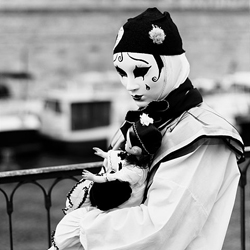Unreasonable Facsimiles
by Anna Dowdall

When I was at my Montreal launch in December, a reader of April on Paris Street (Guernica Editions) complimented me on my research for the Paris chapters, where private eye Ashley Smeeton finds herself out of depth on the job during the Parisian Carnaval. It’s wonderful to meet someone at your launch who’s already read your book, and I didn’t feel like saying, “what research?” I’d done some: but my use of Carnaval as setting was so I could mine its masks and disguises—its uncertainties. Carnaval stands for the way things are unreal in this world, the way they have a tendency to dissolve and vanish. Masks show you how easily this applies to people—and moral assumptions.
April on Paris Street didn’t start out as a deliberate exploration of the carnivalesque, it got there by accident. For Ashley herself, Carnaval, with its masks, is where she first sees there’s something off about her job. She signs on for a lucrative if weird damsel in distress case, with a trip to winter Paris thrown in. Who wouldn’t? Back in North America, faced with multiplying secrets and impersonations, she suspects she’s being played, and is sucked into a Thelma and Louise adventure of the soul. When the masks drop from faces in the big reveal, I want the reader and everywoman Ashley to wonder together, aren’t these maybe masks too?

Back to Parisian Carnaval. Its celebration is many centuries old, and it has been different things at different times. The further back you go, the stranger and more fascinating it gets. The medieval guild of washerwomen (blanchisseuses) held a special ball, hardly less exciting than the parade of the white boeuf gras (fat bull) through the city. These transmute, in my book, into an illegal rave in a public bathhouse and a parade that turns into a public order event.
Public mayhem has always been associated with carnivals, and I also invented an unFashion Event in the Bois de Boulogne, where illegal deals are prosecuted and much money made. The Bortnik brothers, haute couture criminals, send their hoods after Ashley and her client’s wife, in the “mad romp” (to use a reviewer’s words) episode. But the Bortniks are never seen, and do they really exist?
Back in Montreal, down to earth Ashley meets other versions of herself at more than one costume party. One is in fact a cosplay event, which she attends as a 1930s American gangster. But it’s the other party where, as a warrior queen, she has pivotal interactions with a sketchy Grace Kelly and an enigmatic Marie Antoinette, that triggers a fatal reckoning. You get the picture.
Cities are important in April on Paris Street. What is a city, but a maze of places you know, places you think you know, and places you don’t know at all but which you find yourself in by accident, with or without déjà vu? Masks and disguises manifest uncertainty one way; cities do it in another. I said in a recent interview I researched my book by staying at iffy hotels in Parisian quartiers populaires. This was to save money, but it’s true in a way.
For me, the city is the perfect setting for mystery: rife with underbellies and false fronts, labyrinthine, uncanny, and, in the case of Paris and Montreal, bounded by endlessly changing and secretive rivers that sometimes swallow the evidence. More than one critic and reader have commented, it sure isn’t the Paris I know. That’s the idea. I want the reader to follow Ashley to neighbourhoods both familiar and strange, where preconceptions fall by the wayside in an atmosphere of fear.
Lightly invoking lofty themes of identity while sticking to its commercial fiction tropes, April on Paris Street is hybrid literary crime fiction. If it’s literary, it’s not because I annex thematic solemnity to a whodunnit plot. It’s more that I take the conventions of crime fiction, especially character stereotypes but also conventional resolutions, and subvert them.

Women especially are familiar with socially imposed roles or masks: April on Paris Street celebrates the dark humour of using them for unexpected purposes. I’m not really into turning ingenues and victims into femme fatales, or vice versa. I don’t think that dismantles stereotypes at all, in a way it just confirms them. I’ve found it satisfying to treat social masks my female characters are obliged to wear like a good wardrobe of costumes, that they can slip in and out of along the way as needed.
April on Paris Street by Anna Dowdall is available now. For more information visit the author’s website.
